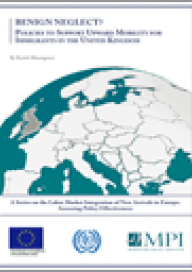Publications
 We author and publish a range of resources to keep you up to date with the latest developments in employment, labour market and human resource policy and practice.
We author and publish a range of resources to keep you up to date with the latest developments in employment, labour market and human resource policy and practice.
All our pdf publications are free to access.
-

Benign Neglect? Policies to Support Upward Mobility for Immigrants in the United Kingdom
Marangozov R | Oct 2014 | Migration Policy InstituteThis report assesses how effectively integration policies in the United Kingdom are helping migrants advance into middle-skilled jobs from low-skilled work or unemployment, focusing in particular on employment services, ESOL, and vocational training.
-

Regulatory Services: Officers for the Future
Summary report for policymakers
Hirsh W | Oct 2014 | Local Government AssociationThis paper, aimed at policymakers, summarises the findings of a small scale exploratory study of what have recently been called the 'regulatory services' of local government, namely trading standards (TS), licensing (L) and environmental health (EH).
-

'"Regulatory Services" officers of the future' - IES research findings for LGA
Hirsh W | Oct 2014 | Institute for Employment StudiesIn early 2014, the LGA Commissioned the IES to undertake an exploratory research piece on the possible direction for officer roles in council ‘regulatory services' – that is, environmental health, trading standards and licensing.
-

Slides: The lies HR tells itself – in rewards
Duncan Brown | Sep 2014 | AON HewittPresentation slides from Duncan Brown, Aon Hewitt, at the IES Annual Provocation: The enemy within: the lies HR tells itself.
-

Slides: What Lies Does HR Tell (About) Itself?
David Guest | Sep 2014 | Kings College LondonDavid Guest, Department of Management, King’s College, London presented these slides at the IES Annual Provocation titled 'The enemy within: the lies HR tells itself'
-
📄
The 2014 RCVS Survey of the Veterinary Professions: Synthesis Report
Robinson D, Williams M, Buzzeo J | Sep 2014 | Institute for Employment StudiesThese surveys for RCVS provide a snapshot of the current state of the veterinary and veterinary nursing professions, with the results providing information in a number of areas, including demographics, work status, job satisfaction and well-being. The results also gauge individual views on the current state of the profession.
-

Service Integration and the Workforce
Sep 2014 | Local Government AssociationTo help support closer working, the Local Government Association (LGA) commissioned IES to undertake a series of case studies of integrated services. Four case studies have been completed and verified so far and are presented in this report. The LGA will be working on further guidance and lessons learnt based on these studies and other information.
-
📄
The 2014 RCVS Survey of the Veterinary Nurse Profession
Williams M, Robinson D | Sep 2014 | Institute for Employment StudiesThese surveys for the Royal College of Veterinary Surgeons (RCVS) provide a snapshot of the current state of the veterinary and veterinary nursing professions, with the results providing information in a number of areas, including demographics, work status, job satisfaction and well-being, among others. The results also gauge individual views on the current state of the profession.
-

The 2014 RCVS Survey of the Veterinary Profession
Buzzeo J, Robinson D, Williams M | Sep 2014 | Institute for Employment StudiesThese surveys for the Royal College of Veterinary Surgeons (RCVS) provide a snapshot of the current state of the veterinary and veterinary nursing professions, with the results providing information in a number of areas, including demographics, work status, job satisfaction and well-being, among others. The results also gauge individual views on the current state of the profession.
-
📄
The Future of Reward Management
From Total Reward Strategies to Smart Rewards
Duncan Brown | Sep 2014 | Sage PublicationsThe author argues that the terminology and concept of “total rewards” is become increasingly meaningless and outdated in our postrecessionary economy of austerity and inequality. Its generic and unthinking application in uniform flexible benefits packages risks isolating the rewards profession into an administrative backwater. Instead he argues for a new approach that he provocatively titles “smart rewards,” following recent thinking and writing in economic and foreign policy on both sides of the Atlantic.
